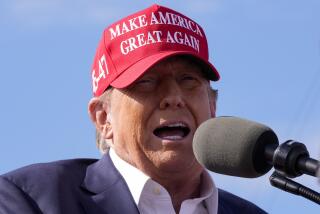Federal contractors donate to ‘super PAC’ backing Romney
A “super PAC” that has spent more than $35 million on behalf of Republican presidential hopeful Mitt Romney has accepted donations from federal contractors despite a 36-year-old ban against such companies making federal political expenditures.
At least five companies with government contracts gave a combined $890,000 to Restore Our Future, the pro-Romney super PAC, a review of federal contracting records and campaign finance data shows.
Other super PACs, including Republican-allied American Crossroads, and Priorities USA Action, which backs President Obama, have language on their websites warning that federal contractors are not allowed to make donations.
Restore Our Future does not list the prohibition on its website.
Several contributors — including a Florida aerospace company that has contracts with the Defense Department, and a Boston-based construction company that is helping build a Navy base — are taking advantage of a legal gray area created by the Supreme Court’s 2010 ruling in the Citizens United case, which said that independent political expenditures could not be regulated based on who was making them.
Federal courts and the Federal Election Commission, which is responsible for enforcing the federal contractor ban, have yet to decide whether it is still valid. That leaves the legality of such contributions in question, though several election law experts believe the ban will be found unconstitutional.
“It’s a risk judgment that clients need to make,” said Robert Kelner, a Washington lawyer who advises corporations on political law compliance.
A veteran election law attorney, Jan Baran, said he advised companies with federal contracts not to give to super PACs until the FEC or the courts formally ruled on whether the ban was still valid.
“We just think it ought to be cleared up,” he said.
Restore Our Future referred all queries to its treasurer, Charlie Spies, an election law attorney who served as Romney’s campaign counsel in his failed 2008 presidential bid. Spies, based in Washington, declined comment.
One company that was apparently unaware of the potential risk says it will ask for its donation back.
M.C. Dean, a Virginia-based electrical engineering company that has a $43-million contract with the Department of Homeland Security to help construct office buildings, gave Restore Our Future $5,000 in October.
The company relied on a letter from Spies, who wrote that the super PAC could accept unlimited corporate contributions, according to an M.C. Dean official who requested anonymity to discuss the decision. The letter did not mention the federal contractor ban, but it assured potential donors that their contributions would not interfere with their ability to obtain state or local contracts.
After an inquiry by the Los Angeles Times/Tribune Washington Bureau, M.C. Dean consulted its lawyers “and out of an abundance of caution and to stay compliant, on Monday we will be requesting the contribution back and will be changing our corporate policy to make sure it doesn’t happen again,” the company official said.
One federal contractor who gave to the super PAC says it is confident the contribution is legal.
Oxbow Carbon, a major coal and petroleum company, gave $750,000 to Restore Our Future last year. The private company has sold more than $10 million worth of coal over the last 13 years to the Tennessee Valley Authority, a federally owned corporation created by Congress.
Oxbow’s founder, Palm Beach, Fla., billionaire William Koch, gave the super PAC another $250,000 personally, a donation that is not prohibited by the ban. His twin brother, David, and older brother, Charles, are famous for their lavish support for conservative causes.
“Oxbow believes it has a 1st Amendment right under the U.S. Constitution to make political contributions to independently support candidates who will best address the deep economic issues facing this country,” spokesman Brad Goldstein said.
The current confusion shows how a deadlocked FEC has been unable to keep up with tens of millions of dollars of outside money that has flooded the system since the Citizens United ruling legalized political spending by corporations and unions.
Two years after the ruling, the six commissioners are split along party lines, and they cannot agree on how to bring campaign finance regulations in line with the decision.
That includes the federal contractor ban, which was originally passed by Congress in 1940 and made it illegal for individuals and companies with government contracts to make federal contributions. It also barred solicitation of such contributions. An FEC regulation passed in 1976 expanded the law to ban federal contractors from making expenditures in support of candidates for federal office.
“What we have is many FEC regulations that are on the books today but are clearly unconstitutional,” Kelner said. “So in that environment, it is not surprising to me that some companies will decide to forge ahead.... What’s the enforcement risk?”
An FEC spokeswoman declined to comment. But the commission is defending the ban in a case filed in federal court in Washington in October by several contractors, indicating that the agency still views the law as constitutional. And at a House oversight hearing last year, a Democratic member of the commission, Cynthia L. Bauerly, testified that the prohibition still holds.
Federal contracting records and campaign finance data provided by the Sunlight Foundation, a nonpartisan group that promotes transparency in government, show that three other companies with federal contracts made contributions to Restore Our Future:
• B/E Aerospace, a publicly traded corporation in Florida that gave the super PAC $50,000 in June 2011, provides rivets and other components to the Department of Defense and other parts of the government. It has won more than $8.2 million in federal contracts since January 2011. Its chief executive and chief financial officer each gave Romney’s campaign $2,500, the maximum allowed in the primary.
• Florida- and Puerto Rico-based Clinical Medical Services, which provides medical supplies to the Department of Veterans Affairs, donated $25,000 on Jan. 4. It has won government contracts worth almost $4.3 million since the start of last year.
• Boston-based Suffolk Construction Co., which holds a $20-million building contract for a Rhode Island naval base, made three donations to the super PAC totaling $60,000. The firm is headed by Obama bundler John Fish, who has given to Democrats and Republicans.
The three companies did not respond to requests for comment.
Times staff writer Maloy Moore in Los Angeles contributed to this report.
More to Read
Start your day right
Sign up for Essential California for news, features and recommendations from the L.A. Times and beyond in your inbox six days a week.
You may occasionally receive promotional content from the Los Angeles Times.






